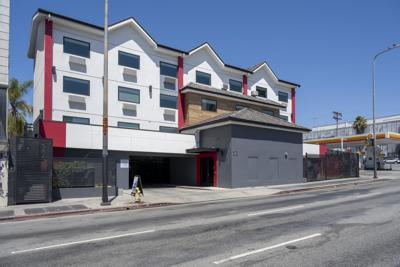
HOLOS Avenida, an affordable housing project in East Hollywood, had its grand opening in August 2023.
California Attorney General Rob Bonta has joined a multi-state coalition to file yet another lawsuit against President Donald Trump’s second administration. This court filing is regarding funding restrictions that will impact affordable housing programs across the country.
The coalition is asking the U.S. District Court for the District of Rhode Island to declare the administration's proposed cuts to the Continuum of Care (CoC) grant program unlawful and prevent them from going into effect. CoC is a Department of Housing and Urban Development (HUD) program that provides funding for affordable housing and additional resources for people at risk or already experiencing homelessness.
“Under both Democratic and Republican presidents, HUD’s Continuum of Care Program has helped states, local governments and nonprofit organizations combat homelessness and provide safe, stable housing to our most vulnerable residents,” said Bonta in a statement. He continued, “this program has proven to be effective at getting Americans off the streets, yet the Trump Administration is now attempting to illegally slash its funding.”
Bonta and a group of 19 attorneys general, alongside two governors, filed the lawsuit Tuesday, arguing HUD’s new restrictions will result in tens of thousands of formerly homeless families and individuals losing their housing. They also argue that not only are the restrictions “cruel,” but that they are illegal.
A few of the housing department’s new policies include:
A requirement that only 30% (down from 90%) of CoC funds be used for permanent housing projects starting next year;
Removing funding from grant applicants who acknowledge and support transgender and gender-diverse individuals; and
Changing the point system that is used to award grants. The states argue this new system will threaten funding for permanent housing and services that help people with mental disabilities and substance use disorders.
The coalition argues that these new restrictions violate multiple laws, including the Tenth Amendment and Spending Clause of the Constitution, as well as violating the Separation of Powers since the President seemingly directed HUD to amend funds already appropriated by Congress.
“As a result, for the 47th time in 44 weeks, I’m taking President Trump to court,” said Bonta. “Those caring for our unhoused neighbors need the federal government’s continued support. Absent judicial intervention, the Trump Administration’s actions would only worsen the homelessness crisis.”
States model their homelessness responses around the CoC grant; in California, billions are invested into the Homeless Housing, Assistance and Prevention program, Homekey+, and the Behavioral Health Services Act.
The state’s 44 CoC hubs received around $683 million in total CoC funding last year, with the vast majority, 90%, going toward permanent housing projects, which are community-based initiatives that provide stable and affordable housing to those experiencing homelessness. These initiatives often also provide special support services to people with disabilities.
Homelessness in California is especially prevalent among the state’s Latino population, which made up about 35% of the state’s homeless adult population, according to a June 2025 report from the University of California, San Francisco (UCSF) Benioff Homelessness and Housing Initiative.
The L.A. CoC's latest report, released in October of this year, showed that Latinos represented 46% of its unhoused population, putting the group at significant risk of losing resources if HUD’s new restrictions go into effect. 54% of these individuals are between the ages of 25-54.
The UCSF report named language and affordability barriers, as well as discrimination and long waitlists, as significant barriers for Latinos to access stable housing. The report recommended the state invest in culturally-rooted services, family-centered interventions and a removal of these systemic barriers to housing and other support services.
The California Department of Social Services has a webpage listing key housing programs in the state. For additional information and support, individuals can also call or text 211 to connect with local social services.











(0) comments
Welcome to the discussion.
Log In
Keep it Clean. Please avoid obscene, vulgar, lewd, racist or sexually-oriented language.
PLEASE TURN OFF YOUR CAPS LOCK.
Don't Threaten. Threats of harming another person will not be tolerated.
Be Truthful. Don't knowingly lie about anyone or anything.
Be Nice. No racism, sexism or any sort of -ism that is degrading to another person.
Be Proactive. Use the 'Report' link on each comment to let us know of abusive posts.
Share with Us. We'd love to hear eyewitness accounts, the history behind an article.